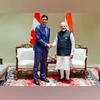US spy agencies provided information to Ottawa after the killing of a Khalistan terrorist in the Vancouver area but Canada developed the most definitive intelligence that led to Prime Minister Justin Trudeau to make allegations against India, triggering a diplomatic standoff, The New York Times reported citing Western allied officials.
In the aftermath of the assassination of Hardeep Singh Nijjar, US intelligence agencies shared context with their Canadian counterparts, contributing to Canada's determination of India's role in the incident. However, what appears to be the crucial piece of evidence, intercepted communications involving Indian diplomats in Canada, indicating their involvement in the plot, was collected by Canadian officials, as confirmed by allied officials, according to the report in the NYT.
While US Secretary of State Antony J Blinken has called upon India to cooperate with the Canadian investigation, US officials have been cautious about triggering any diplomatic backlash from India. Nevertheless, the revelation of US intelligence involvement risks "ensnaring" Washington in the ongoing diplomatic dispute between Canada and India, just as the US seeks to strengthen its partnership with New Delhi, NYT reported.
US intelligence agencies did not become aware of the plot or evidence implicating India until after Nijjar was killed, according to the allied officials.
Prior to his killing on June 18 outside a gurduwara, Canadian authorities had repeatedly warned Nijjar about the threats against him and advised him to avoid going to the temple.
After his death, American officials informed their Canadian counterparts that they had not possessed any advance information about the plot. They emphasized that if they had, they would have promptly shared it with Ottawa under the "duty to warn" doctrine observed by intelligence agencies, according to two allied officials.
More From This Section
The United States routinely shares substantial amounts of intercepted communications with its closest intelligence partners, including Canada. However, in this case, the contextual information regarding the assassination was deliberately shared as part of a comprehensive package of various intelligence streams, the NYT reported.
The US officials have been cautious about discussing the assassination. While the United States aims to assist Canada, its close ally, it also seeks to avoid alienating India, a partner with whom it hopes to expand ties as a counterbalance to China's growing influence in Asia.
The accusations have strained diplomatic relations between Ottawa and New Delhi, leading both countries to expel each other's intelligence officers, with India suspending visas for Canadians.Prime Minister Justin Trudeau and Canadian officials have refrained from disclosing the specific intelligence gathered regarding India. Canadian authorities argue that it is crucial not to jeopardise the Royal Canadian Mounted Police's ongoing investigation into the murder, according to the newspaper report.
Allied officials have refrained from providing detailed descriptions of the intelligence shared by the United States, while a Canadian government official, speaking anonymously due to the sensitivity of the information, confirmed that they had received intelligence from multiple countries.
India, however, dismissed the allegations calling them "absurd and motivated".
)